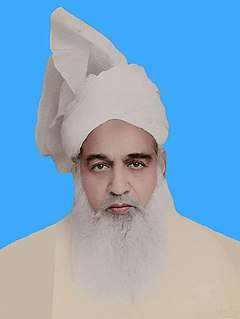Ghulam Ali Okarvi
Shaikh ul Quran Ghulam Ali Okarvi (Urdu: غلام علی اوکاڑوی) (11 June 1919 CE or 20 Ramadan 1337 AH – 16 May 2000 CE or 11 Safar 1421 AH) was an Islamic scholar, orator, jurist, muhadis, mufasir, linguistician, in Pakistan. He carried out the duty of teaching Qur'aan and Ahadeeth for more than 50 years, and made thousands of individuals into scholars called "Sheikh-ul-Islaam wal Muslimeen". Even the Ulama of Egypt, Syria and Iraq have sought permission from him to teach Hadeeth and Tafseer. Naqeebul Ashraaf, Saiyyid Peer Tahir Allauddin Al-Qadri Al-Gillani used to refer to him with the title of "Ustaazu Asaatiza tina" (Teacher of our teachers).[1][2]
Ghulam Ali Okarvi غلام علی اوکاڑوی | |
|---|---|
 | |
| Title | Shaikh ul Quran |
| Personal | |
| Born | 11 June 1919 |
| Died | 16 May 2000 (aged 80) Jinnah Hospital, Lahore, Punjab, Pakistan |
| Religion | Islam |
| Nationality | British India, Pakistani |
| Era | Modern era |
| Region | South Asia |
| Jurisprudence | Hanafi |
| Creed | Sunni |
| Main interest(s) | Tafseer, Hadith, Fiqh, Aqeedah, Linguistics, Tasawwuf |
| Muslim leader | |
Influenced by
| |
Influenced
| |
Life
Early Life and Family
Ghulam Ali was born in a small village 'Babanian' near Lalamusa, Gujrat, Pakistan. His ancestors were the founders of this village. They come to this place about 5 to 6 generations before him from Hazratbal Shrine, Srinagar and named it Babanian. After settlement they distribute their land to other people to strengthen their village.
He got his primary education from Govt. Model Primary School in 'Umar Chak (village attach to Babanian)' and middle level education from Middle School Jora Karnana in 'Jora Karnana (village near Babanian)'.
He started his early persian language education from Umer Chak.
Higher Education
For higher education he formally studied in Jamia Arbia Karimia Hanfia (branch of Anjuman Hizbul Ahnaf, Lahore) in Jalandher, India and Hizb ul Ahnaf, Lahore. Further he greatly influenced from different scholors of his era, Naeem u deen Muradabadi, Ahmad Yaar khan Naeemi, Abul Hasanat Qadri, Syed Muhammad Asharfi....etc
Death
Shaikh ul Quran died on Tuesday 11 June 2000 CE (11 Safar 1421h) at the age of 80 in Jinnah Hospital, Lahore. He was buried in his owned (purchased) land in Jamia Hanfia Dar ul Uloom Ashraf ul Madaris at GT Road Okara.
Legacy
- He have permission of all sufi salasils of subcontinent Qadriya, Naqshbandia, Soharvardiya, Chistia even he have permission from the salasils of Arab countries Egypt, Iraq, Syria... etc.
He took bait on the Hand of Abul Barakat Syed Ahmad Qadri[3] from Hizb ul Ahnaf, Lahore who gave him the title 'Shaikh ul Quran' later recognized by others. In 1957 he was the first Pakistani Scholor who started Dora e Quran in the country.
Many famous scholors of his era greatly influenced by him.
In 1964 he was with other scholors declared that to assign the office of the Head of the State to a female is "un-Islamic and Haram", besides being "destructive" for the country and the nation[4]
Uras celebrations on his mausoleum
Every year devotees celebrate his Uras. The last two-day annual Urs (anniversary) was in Okara on Tuesday 1 November 2017. According to Maulana Pir Khalid Zahid Ashrafi, the Urs celebrations was observed under the guidance of shrine caretaker Pir Mufti Fazlur Rehman Okarvi. He said that renowned religious scholars including Kaukab Noorani Okarvi, Syed Muzaffar Hussain Shah, Gulzaman Attari, Imran Asi attended the Urs. Devotees from across the country and also the foreign countries attended the occasion. The Urs was concluded on 1 November after Isha prayers.[5]
Disciples
- Muhammad Shafee Okarvi.
- Mufti Ahmad Yaar Khan, head teacher of the Jaami'ah Ashraful Madaaris, Okara.
- Mufti Ghulam Yasin, head of Juristication in Ashraf ul Madaris, Okara.
- Mufti Fazal e Subhan Qadri KPK.
- Pir Muhammad Chishti, KPK.
- Mehfooz ul Haq Shah, Burewala.
- Mufti Muhammad Abdus-Subhaan Qaadri of Darul Uloom Qaadiryah Subhaaniyah, Karachi.[1]
- Pir Sabir Shah, Former Chief Minister of KPK.
- Kaukab Noorani Okarvi
Politics
He take part in Pakistan Movement on the platform of All India Sunni Conference.
In 1948, he was one of the founding members of Jamiat Ulema-e-Pakistan. Later on he continue his struggle for the implementation of Islamic Constitution in the country. After on he actively participate in the Movements of Khatme Nabuwat[6] and Nizam e Mustafa in the Country. .[7]
In 1969, after Ayub Khan (President of Pakistan) era he gathered JUP splits in Lahore and unite them to take part in election. His party was the third biggest party of West Pakistan in 1970's election. He remained its Punjab Chapter's President in 1970s[8] page 91. In 1977 he was also the Punjab President of Pakistan National Alliance.
References
- "Imam Ahmed Raza Academy - Deviant Sects and Scholars - Tahirul Qadri - Ulama of Okara Tackle the Professor". www.raza.org.za. Archived from the original on 13 February 2018.
- "Archived copy" (PDF). pp. 14–15. Archived (PDF) from the original on 13 February 2018. Retrieved 6 February 2018.CS1 maint: archived copy as title (link)
- "Archived copy". Archived from the original on 13 February 2018. Retrieved 7 February 2018.CS1 maint: archived copy as title (link)
- Agencies (6 December 2014). "From the past pages of dawn : 1964 : Fifty years ago : Woman ruler 'un-Islamic'". Archived from the original on 28 July 2015.
- begin "Two-day Urs celebrations begin" Check
|url=value (help). Archived from the original on 5 November 2017. - https://www.khatm-e-nubuwwat.org/lawyers/data/Books/pdf/qad-defeated-in-the-Parliament.pdf
- Ahmad, Mujeeb (12 February 1993). Jamʿiyyatal Ulama-i-Pakistan, 1948-1979. National Institute of Historical and Cultural Research. ISBN 9789694150345. Archived from the original on 13 February 2018 – via Google Books.
- Ahmad, Mujeeb (12 February 1993). Jamʿiyyatal Ulama-i-Pakistan, 1948-1979. National Institute of Historical and Cultural Research. ISBN 9789694150345. Archived from the original on 13 February 2018 – via Google Books.